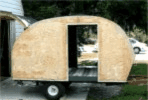1) Yes
2) Yes
3) When the trailer and vehicle are hitched, Yes
4) Yes, you ground it anywhere to the metal. Typically near the battery.
5) When the trailer and vehicle are hitched, Yes
6) You can do this, if the structure is wood, you will have to.
7) The main reason to ground the battery to the frame is fewer wires. For example; You have to hook up a light in a car, you only have to run the positive wire. The negative is made where the base screws into the sheetmetal. In fiberglass cars and wooden teardrops, you don't have this luxury. You will have to run the negative wire, not necessarily back to the battery, but at least to a common negative bus (frame).
Pics of fuse boxes/wiring...please post
42 posts
• Page 3 of 3 • 1, 2, 3
I must be dense
asianflava wrote:1) Yes
2) Yes
3) When the trailer and vehicle are hitched, Yes
4) Yes, you ground it anywhere to the metal. Typically near the battery.
5) When the trailer and vehicle are hitched, Yes
6) You can do this, if the structure is wood, you will have to.
7) The main reason to ground the battery to the frame is fewer wires. For example; You have to hook up a light in a car, you only have to run the positive wire. The negative is made where the base screws into the sheetmetal. In fiberglass cars and wooden teardrops, you don't have this luxury. You will have to run the negative wire, not necessarily back to the battery, but at least to a common negative bus (frame).
SO in response to #7...If the frame is not used to complete the circuit in a fiberglass or wooden tear, why ground the battery to the frame for the cabin/galley "house" light system, since all these cuircuits are hard wired to that battery?
What is the electrical reason for doing so?
Thanks for the info I don't want to have a flaming experience!
DEE
Grace happens...
-

Dee Bee - 500 Club
- Posts: 696
- Images: 55
- Joined: Fri Jun 04, 2004 9:17 pm
- Location: York, PA

